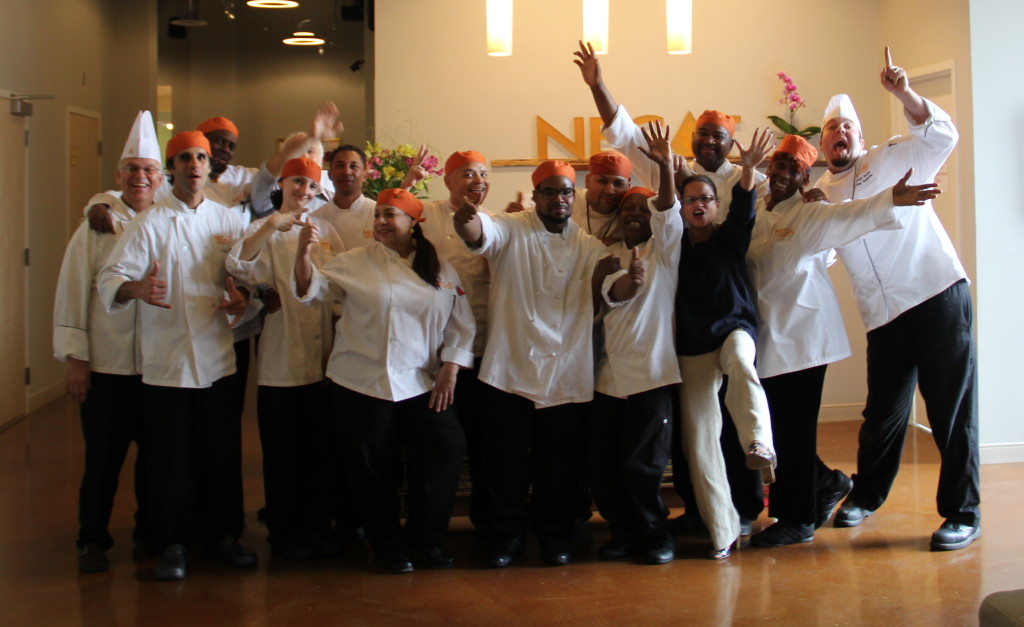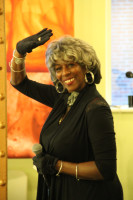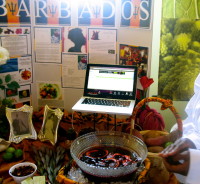NECAT Tackles Community Health, One Student at a Time

“What are you eating?” Fulani M. Haynes, a retired RN, asks students at the New England Center for Arts and Technology (NECAT). “What happens when you put this food in your body?” Fulani urges people to think about their food; NECAT, a culinary job-training program for people with limited resources, teaches them how.
 Recently, I sat down with Fulani to discuss the culinary health program she is developing in conjunction with NECAT. After completing twenty-two weeks of culinary academics here, she’s now spending six weeks as an intern at NECAT, designing her own academic program. “Let’s take my nursing skills, integrate them with my culinary skills, and blend the two together,” explains Fulani about the genesis of her idea. Hopefully, this recipe will mean great things for NECAT’s students and the communities they live in.
Recently, I sat down with Fulani to discuss the culinary health program she is developing in conjunction with NECAT. After completing twenty-two weeks of culinary academics here, she’s now spending six weeks as an intern at NECAT, designing her own academic program. “Let’s take my nursing skills, integrate them with my culinary skills, and blend the two together,” explains Fulani about the genesis of her idea. Hopefully, this recipe will mean great things for NECAT’s students and the communities they live in.
Fulani speaks passionately about the barriers facing healthy living in America today and the lack of knowledge about nutrition. “If a big business wants to sell fifteen million bags of unhealthy snacks in 2014, they’re not going to educate people. We’ve been hypnotized to want the bad stuff,” she observes.
And she’s right. By now, we’ve all heard the daunting statistics on obesity in America, and there’s no end in sight. Since the 1960s, obesity in the U.S. has increased by over fifty percent. It contributes to a majority of fatal diseases and cuts life expectancy by up to 14 years. Organizations like the Food Research and Action Center are taking a hard look at why the prevalence of obesity increases significantly in low-income communities. In poor neighborhoods, residents can face formidable obstacles to healthy living including easy access to supermarkets and fresh produce, as well as the infrastructure needed for physical exercise and outdoor activities.
 So, does such a serious problem have a solution? When asked how to address this inequity, Fulani stresses the importance of nutrition education. In all areas of her life she invites people to learn about food, educating everyone from children to seniors on the benefits of eating well. Whether it’s gardening in the Dudley Greenhouse, cooking at Haley House’s Take Back the Kitchen, providing nutrition consulting through Fulani’s Kitchen, or sharing plots of her personal garden with neighborhood families, Fulani is committed to educating others. “Why don’t we focus on preventive measures? Why don’t we teach people how to live healthy lives?” asks Fulani, her voice charged with urgency.
So, does such a serious problem have a solution? When asked how to address this inequity, Fulani stresses the importance of nutrition education. In all areas of her life she invites people to learn about food, educating everyone from children to seniors on the benefits of eating well. Whether it’s gardening in the Dudley Greenhouse, cooking at Haley House’s Take Back the Kitchen, providing nutrition consulting through Fulani’s Kitchen, or sharing plots of her personal garden with neighborhood families, Fulani is committed to educating others. “Why don’t we focus on preventive measures? Why don’t we teach people how to live healthy lives?” asks Fulani, her voice charged with urgency.
That’s where NECAT enters the picture. Undoubtedly, health advocacy and nutrition education are imperative to solving the inequity facing people with limited resources. Here, culinary health is becoming more and more of a focus. While career building is an essential part of NECAT, so is the development of the individual student. The proposed culinary health program will fuse career advancement and personal growth, providing a comprehensive approach to wellbeing, targeting students as well as community health workers with direct impact on their patients’ home life.
Certainly, staggering obstacles remain for the health and livelihood of Americans in low-income neighborhoods. But Fulani, as well as many other NECAT students, appreciate the chance NECAT has given them to learn beyond just basic job training. “This school experience put me in a position of power to be able to experiment with my vision for improved community health,” says Fulani gratefully. “My dream for this second career has finally become a reality.”
Plans for the NECAT culinary health program are still in the early stages, but I am excited to see what will happen in over the next year. It’s clear that with educators like Fulani at the helm, NECAT students will transform their own lives and those around them, not just through health, but also through community. “The hunger for love is much more difficult to remove than the hunger for bread,” Mother Teresa once remarked. NECAT and Fulani are tackling both those hungers simultaneously with lots of community support and, of course, some world-class cooking.
Below are a few additional articles that address issues and policies related to culinary health both locally in Boston and nationally:
The Food Project in Boston
The New Face of Hunger in America
Updated School Lunches a Success
Mobile Food Pantries
Boston’s Obesity Disparities
 ABOUT MEG O’NEILL, 2014 TACC SUMMER INTERN AT NECAT: Meg spent 12 weeks working at the New England Center for Arts and Technology (NECAT), a new career-directed educational non-profit located in the Roxbury section of the City of Boston. At NECAT, Meg developed an immediate connection with the organization’s mission, its staff, and its students. This blog posts focuses on Fulani Haynes, of the many inspiring students she met this summer. (A person of many talents, Fulani is pictured above performing with her jazz ensemble for the one-year anniversary of NECAT.) Now a senior at Boston College studying Philosophy and the African Diaspora, Meg will continue to work at NECAT this year as a communications associate, heading their website and social media presence, as well as planning quarterly community events; NECAT will also be her home base for a year-long public health research project. A native of Buffalo, NY, Meg anticipates roaming the globe for few years after graduation and engaging in direct services in the field of public health.
ABOUT MEG O’NEILL, 2014 TACC SUMMER INTERN AT NECAT: Meg spent 12 weeks working at the New England Center for Arts and Technology (NECAT), a new career-directed educational non-profit located in the Roxbury section of the City of Boston. At NECAT, Meg developed an immediate connection with the organization’s mission, its staff, and its students. This blog posts focuses on Fulani Haynes, of the many inspiring students she met this summer. (A person of many talents, Fulani is pictured above performing with her jazz ensemble for the one-year anniversary of NECAT.) Now a senior at Boston College studying Philosophy and the African Diaspora, Meg will continue to work at NECAT this year as a communications associate, heading their website and social media presence, as well as planning quarterly community events; NECAT will also be her home base for a year-long public health research project. A native of Buffalo, NY, Meg anticipates roaming the globe for few years after graduation and engaging in direct services in the field of public health.